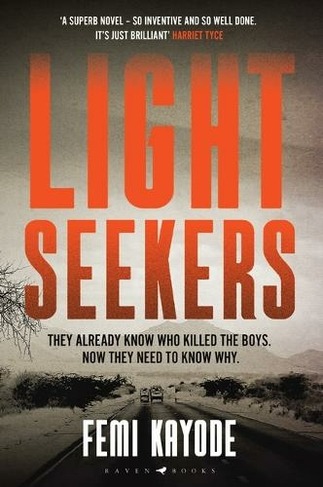search
date/time
 | Yorkshire Times A Voice of the Free Press |

Caroline Spalding
Features Correspondent
12:19 PM 17th February 2021
arts
Review: Lightseekers By Femi Kayode

It’s the story of investigative psychologist Philip Taiwo, who has been hired to discover not who the murderer was in a crime, but instead the harder question, of why did it happen? And as we move through the novel, it feels like Philip is getting further entangled in a web of deceit, corruption and at times, the incomprehensible –the reader must keep their wits about them to keep their finger on the pulse.
The novel is structured in ‘acts’ – each is given a title, with the first being: “light reflects in several directions when it bounces off a rough barrier.” A fairly prosaic description, but it captures the complexity Philip is about to plunge into. Each act’s title is about the distortion of light – as if light in the plot is the truth, refracting and deflecting at tangents we struggle to keep up with.
You like Philip from the start. He is one of the few characters that appears to have both feet firmly on the ground. He is deeply insightful by profession, but he never flaunts his skill or intellect, his style is more under-the-radar. The novel opens with his flight into Port Harcourt, a large city in Nigeria, and we soon learn he is a recent returnee from the United States and that things here are not what they are back across the water.
He travels to a ‘sleepy university town’ of Okriki where three students were brutally murdered, with the whole grisly episode caught on social media. The legal trial of the accused is about to begin and the father of one of the murdered young men has hired Philip in desperation for answers, for closure. In response to his spirited wife’s reminder that he is not a detective, he tells her he has been hired only to investigate why what happened, happened. She warns him that he is taking his profession into a real and dangerous world, and it appears that, as usual, the lady is right.

Femi Kayode
Chika is local, he knows what’s what, yet there is always an air of mystery about him. We soon see he is more than just a driver; he essentially becomes Philip’s sidekick and it would appear he knows more than he lets on. They meet the local police chief, who becomes another important figure in the plot, and we quickly suspect that the local police force is riddled with corruption, echoing perhaps the underhand nature of wider society. It swiftly becomes apparent that nothing will be straightforward in Philip’s task.
The plot is driven by the narrative; it is pacy, but not frenetic. Velocity accelerates towards the climax, but so should any dynamic crime drama - you have to build up for the finale. Philip remains the calm in the storm, but at times even he doubts himself, questions his own impeccable judgement, and some secrets elude him. Lightseekers ticks all the boxes of a good crime fiction novel – it is complex, there are numerous twists, and you begin to doubt almost every character. At times we feel a sense of futility: will Philip get to the bottom of it, or is he trying to untangle a web that resolutely will not be undone?
Also by Caroline Spalding...
Review: Cold Enough For Snow By Jessica AuReview: Good Intentions By Kasim AliReview: Strangers I Know By Claudia Durastanti, Translated By Elizabeth HarrisWalking For Wellbeing – It Really Does WorkReview: The Love Songs Of W.E.B. Du Bois By Honorée Fanonne JeffersThe book is enticing, compelling and cleverly written; the skills of Kayode as psychologist are dexterously employed. But the pre-eminent strength of Kayode’s writing lies in his characterisation. The ‘cast’ are all clearly visualised, enlivened – there are no long passages on character appearance, all is adroitly brought to life in dialogue. Conversational exchanges efficiently convey unspoken emotion, and we understand how heritage plays such an important role in another unspoken aspect – that of the hierarchy, the sense of place in society.
For a thoroughly engaging romp through a psychological thriller, this is one to read. Remarkably, the novel won the 2019 UEA Crime Writing Prize whilst it was still being written, and I would certainly recommend it. Philip Taiwo is a character who is set to appear in a new series, and I will be first in line to follow his second outing.
Lightseekers is published by Bloomsbury
More in this series...
Review: The Stranding By Kate SawyerReview: You Let Me In by Camilla BruceInterview With Victoria PrincewillThe Traumatic Legacy of Denial: The Sanatorium By Sarah PearseThe Imposter by Anna Wharton: A ReviewGirl In The Walls By A.J. Gnuse - A ReviewAn Interview with Alice Ash - Author of Paradise Block‘ …Really Real Poor People, Surviving Alone Together’: Paradise Block By Alice AshInterview: Neema ShahKololo Hill By Neema Shah: A ReviewInterview With Catherine Menon - Author Of Fragile Monsters‘Ghosts Everywhere I Look. Ghosts Everywhere I Don’t’: Fragile Monsters By Catherine MenonInterview: Bethany CliftLast One At The Party By Bethany Clift: A Review'There Is No Such Thing As Fate, Because There Is Nobody In Control': My Name Is Monster By Katie HaleInterview With Frances Quinn - Author Of The Smallest Man'A Hero Of Our Time!': The Smallest Man By Frances QuinnInterview: Thomas McMullan, Author Of The Last Good ManReview: The Last Good Man By Thomas McMullanInterview With Nikki Smith - Author Of All In Her Head